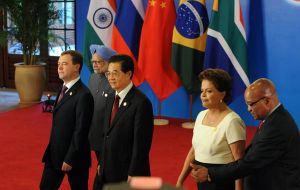MercoPress. South Atlantic News Agency
BRICS members discuss trade grievances with host China
 The official picture of the five leaders, smiles…but also differences (Photo Chinadaily)
The official picture of the five leaders, smiles…but also differences (Photo Chinadaily) Chinese President Hu Jintao came under pressure from fellow BRICS members Brazil, Russia, India and South Africa to open the Chinese market to goods ranging from Indian drugs to Brazilian planes as leaders gathered on a tropical south China island for a summit.
Indian Prime Minister Manmohan Singh pressed Hu in a bilateral meeting to find ways to reduce India’s trade deficit with China by boosting imports of Indian information technology and pharmaceutical products, Indian National Security Adviser Shivshankar Menon said in Sanya, China.
China, Russia, India, Brazil and South Africa, brought together under the Goldman Sachs Group Inc.-coined acronym, are divided over a range of trade disagreements. Brazil and India are pushing China to buy more value-added goods. South Africa wants more iron ore and other raw materials processed at home before exporting them to China. Brazil and India have also complained that China’s Yuan is undervalued, undermining their exports.
The countries “don’t have the same interests” Jim O’Neill, chairman of Goldman Sachs Asset Management International, who came up with the term BRIC in 2001, said in a recent interview.
“The wealth per head is very different, the politics is very different, and the philosophy and their natural economic edge is different.” South Africa was invited to join the BRIC this year, giving the group its “S”.
Chinese Commerce Minister Chen Deming assured his counterparts in a closed-door meeting that China would make it a priority to import more value-added products from BRICS countries, Indian Trade Minister Anand Shama said in Sanya.
Oleg Fomichev, Russia’s deputy economic development minister, said China had pledged to set up high-technology projects with Russia, “not just importing our resources and exporting industrial goods.”
The five nations agreed to push for Russia’s entry into the World Trade Organization and called for progress in the Doha Round of WTO trade talks. Chen told reporters that the BRICS nations “still face economic overheating issues such as inflationary pressure and asset bubbles.”
The difficulties faced by Brazil, Russia, India and South Africa in increasing high-technology and manufactured exports to China was underscored this week by Brazilian aircraft-maker Embraer. The company failed to get China’s government to approve final assembly of its E-190 aircraft in China because of concerns it would compete with a domestic regional jet, Chief Executive Officer Frederico Curado said in Beijing. Howeer Embraer will build business jets in China.
“We had the goal of building the 190 here but the Chinese government didn’t approve the project,” Curado said. The government was concerned that there wouldn’t be enough demand for both the E-190 and China’s rival ARJ21, he said.
Complaints from Brazilian unions and industry groups, including toymakers and textile producers, have led the Brazilian government to enact 29 anti-dumping measures aimed at Chinese-made goods, more than those against any other country and almost four times more than directed at the US, according to the Trade Ministry. The measures aim to limit imports on goods the government believes are being sold below cost. Last week, Brazil approved higher levies on Chinese-made viscose textiles.




Top Comments
Disclaimer & comment rules-

-

Read all commentsWell they do say BRICS & MORTOR, go together.
Apr 14th, 2011 - 06:40 pm 0untill someone nocks it down ??
Mercopress is unclear:
Apr 15th, 2011 - 12:43 am 0Are there Chinese tariff barriers against the Brasilian small E-190 domestic jet *imported as a Brasilian-assembled, fully operational aeroplane*?
Or are the price differentials simply related to the two country's salary levels?
Does Embraer simply wants to produce in China to reduce production costs - and then sell the products on the world markets?
Or all the assembled planes intended for the China market?
If the Chinese exports to Brasil are being sold to Brasil 'below the cost of manufacture' and transportation, does this include or exclude the 60% tariff imposed by Brasil?
If Brasil's outcome of this trade round is the removal of tariffs on her imports, how will this benefit the home industries?
Is the debate with China concerning allowing importation of cutting-edge technological products into China a win, or a win-win, or a sadly academic outcome? Because where are these Brasilian cutting-edge products?
Commenting for this story is now closed.
If you have a Facebook account, become a fan and comment on our Facebook Page!